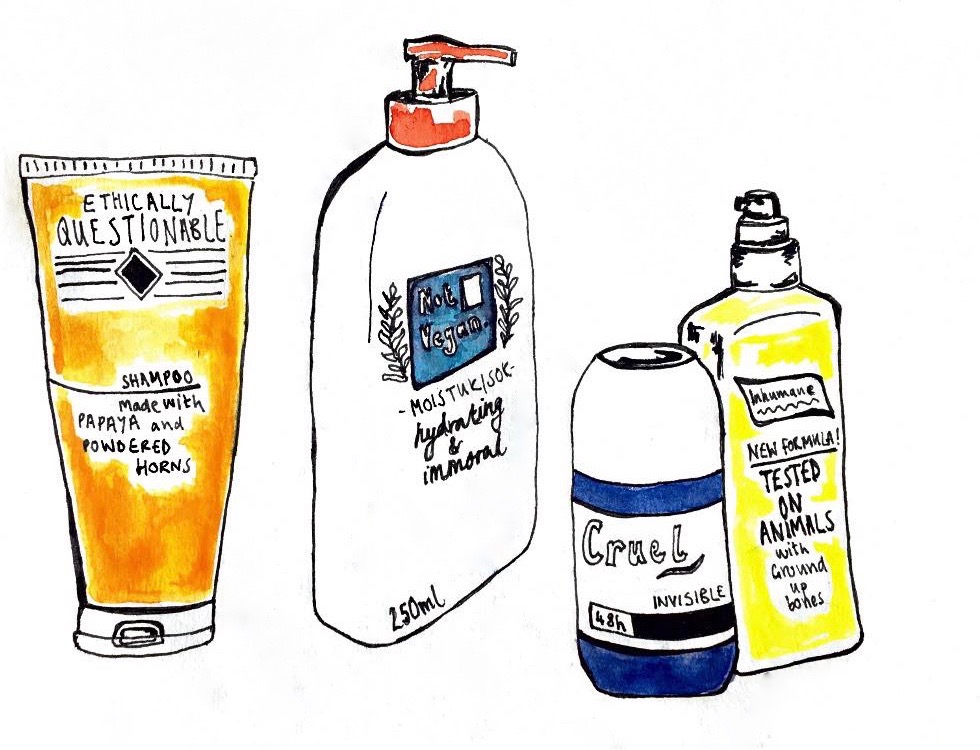What's in your make up bag?
The truth about vegan beauty products
By Georgia Rees-Lang

Illustration by Elsa Pearson
As well as the year that #MeToo went global and football (nearly) came home, 2018 could probably most accurately be labelled the ‘year of the vegan’.
Around 3.5 million Brits are now following a plant based diet, up from just half a million in 2016, while many more are beginning to at least cut down on animal product consumption. Although that number is still only 5% of the UK population, figures seem to show that around half of this number is made up by 16-24 year olds (sound the ‘millennial’ klaxon…) meaning it looks like a trend that is only set to keep growing.
But while ordering an oat milk latte will no longer provoke the same kind of response as ordering a steaming hot cup of sewage water, when it comes to products we put on rather than in our body, it doesn’t always seem to be as easy to go vegan. When it’s our looks on the line, are we as prepared to make sacrifices in our choice of makeup and beauty products for the sake of our furry friends? And how easy is it to tell if the products marketed as ‘natural’ are truly vegan, or even cruelty free?
The first question is interesting. While many of us appear to be relatively clued up on the potential cruelty involved in mass animal farming, beauty products seem to be somewhat of an ethical blind spot.
Part of the problem might be to do with the deliberately complex labelling of many skincare products. Confusing and scientific sounding ingredients can often be used to disguise the fact that the product contains a (far less glamorous sounding) animal product. Keratin for example, an ingredient often found in shampoos and anti-wrinkle face creams, is often made from powdered horns, hooves, feathers, quills, or hair. And while most veggies know to avoid certain sweets that contain gelatine (made from boiled bones of various farm animals), perhaps it’s not always as obvious to check whether your face mask or moisturiser contains it.

Speaking to my peers, it seems that this does appear to at least partly be the case. ‘I don’t really buy vegan or cruelty free make-up, and it’s not because I don’t want to or don’t think that it’s a good thing’, says Lucy, 22, a Bristol University history graduate. ‘I am just not in the habit of actually thinking about it in the same way I would think about where my meat was coming from. It’s something that I feel I should do but I am sad to admit that I need to be reminded of it more.’ Maya, 20, a care worker from Brighton, agrees that makeup shopping as a vegan can be confusing. ‘I find it time consuming to research’ she says. ‘I know that a lot of companies are owned by bigger brands which aren't cruelty free; it feels like a difficult issue to get right'.
This last comment raises an important issue. If a brand releases a vegan and cruelty-free range of products, but is still owned by another brand, or stocks other makeup which isn’t these things, is it still ethically sound to support? In 2017, Superdrug released its fully vegan makeup range, B. ‘A couple of years ago we noticed it was becoming far more important to have vegan-friendly products,’ says Sarah Gardner, Superdrug’s Head of Beauty. ‘More and more customers were searching our site looking for vegan products.’ Yet while the chain says it is proud to ‘ensure that those who don’t want animal by-products in their makeup have a collection they can trust’, it begs the question as to whether they really do care about reducing global animal product consumption, or are just trying to reach their sales targets by providing for a wider customer base.
All of Superdrug’s other own brand makeup still contains animal products, while the stores also continue to stock makeup from brands such as Benefit and L’Oreal, who have both been accused of using ‘loopholes’ by PETA and other vegan organisations to continue to test their products on animals outside of the UK. If you buy a vegan product sold by a company that is not entirely animal free, is that still supporting the industry to some extent? It’s a tough question, for sure. It’s the same conundrum when it comes to more ‘ethical’ brands being bought out by larger companies. It appears to be a case of weighing up the pros and cons of each brand’s aims, and making an informed decision.

In fact, with a little bit of forward planning, it can be pretty easy to make the switch. PETA’s handy ‘Bunny Free’ app lets you easily search for beauty products that are cruelty free, while a growing number of products are now ensuring they display the certified vegan ‘sunflower’ logo, making it far easier to quickly check if a product is truly animal free at a glance of the label. And while their motivations could perhaps be questioned, it does seem that the big beauty companies are starting to take veganism seriously. ‘I think the market has massively changed,’ says Gardner. ‘People are doing more research and not just taking what they see on the high street as the only offer.’ And with sales of vegan beauty products at an all-time high – rising a huge 38% just between 2017 and 2018 – it really does seem there’s no longer any excuses not to make sure your makeup bag is as guilt free as your fridge.
Art by
Words by
Share this article

